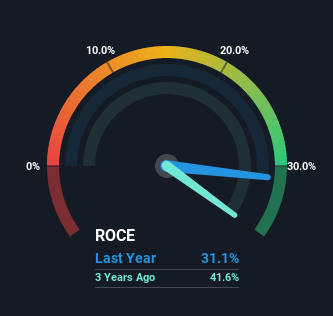Oracle Financial Services Software (NSE:OFSS) Will Be Hoping To Turn Its Returns On Capital Around

If we want to find a potential multi-bagger, often there are underlying trends that can provide clues. Firstly, we'll want to see a proven return on capital employed (ROCE) that is increasing, and secondly, an expanding base of capital employed. This shows us that it's a compounding machine, able to continually reinvest its earnings back into the business and generate higher returns. Having said that, while the ROCE is currently high for Oracle Financial Services Software (NSE:OFSS), we aren't jumping out of our chairs because returns are decreasing.
Understanding Return On Capital Employed (ROCE)
For those that aren't sure what ROCE is, it measures the amount of pre-tax profits a company can generate from the capital employed in its business. Analysts use this formula to calculate it for Oracle Financial Services Software:
Return on Capital Employed = Earnings Before Interest and Tax (EBIT) ÷ (Total Assets - Current Liabilities)
0.31 = ₹24b ÷ (₹87b - ₹9.9b) (Based on the trailing twelve months to March 2022).
So, Oracle Financial Services Software has an ROCE of 31%. That's a fantastic return and not only that, it outpaces the average of 12% earned by companies in a similar industry.
See our latest analysis for Oracle Financial Services Software

Above you can see how the current ROCE for Oracle Financial Services Software compares to its prior returns on capital, but there's only so much you can tell from the past. If you'd like, you can check out the forecasts from the analysts covering Oracle Financial Services Software here for free.
So How Is Oracle Financial Services Software's ROCE Trending?
When we looked at the ROCE trend at Oracle Financial Services Software, we didn't gain much confidence. Historically returns on capital were even higher at 49%, but they have dropped over the last five years. However it looks like Oracle Financial Services Software might be reinvesting for long term growth because while capital employed has increased, the company's sales haven't changed much in the last 12 months. It may take some time before the company starts to see any change in earnings from these investments.
On a side note, Oracle Financial Services Software has done well to pay down its current liabilities to 11% of total assets. That could partly explain why the ROCE has dropped. Effectively this means their suppliers or short-term creditors are funding less of the business, which reduces some elements of risk. Some would claim this reduces the business' efficiency at generating ROCE since it is now funding more of the operations with its own money.
The Bottom Line
To conclude, we've found that Oracle Financial Services Software is reinvesting in the business, but returns have been falling. And with the stock having returned a mere 12% in the last five years to shareholders, you could argue that they're aware of these lackluster trends. As a result, if you're hunting for a multi-bagger, we think you'd have more luck elsewhere.
If you'd like to know about the risks facing Oracle Financial Services Software, we've discovered 1 warning sign that you should be aware of.
Oracle Financial Services Software is not the only stock earning high returns. If you'd like to see more, check out our free list of companies earning high returns on equity with solid fundamentals.
New: AI Stock Screener & Alerts
Our new AI Stock Screener scans the market every day to uncover opportunities.
• Dividend Powerhouses (3%+ Yield)
• Undervalued Small Caps with Insider Buying
• High growth Tech and AI Companies
Or build your own from over 50 metrics.
Have feedback on this article? Concerned about the content? Get in touch with us directly. Alternatively, email editorial-team (at) simplywallst.com.
This article by Simply Wall St is general in nature. We provide commentary based on historical data and analyst forecasts only using an unbiased methodology and our articles are not intended to be financial advice. It does not constitute a recommendation to buy or sell any stock, and does not take account of your objectives, or your financial situation. We aim to bring you long-term focused analysis driven by fundamental data. Note that our analysis may not factor in the latest price-sensitive company announcements or qualitative material. Simply Wall St has no position in any stocks mentioned.
About NSEI:OFSS
Oracle Financial Services Software
Provides information technology (IT) solutions and business processing services to the financial services industry worldwide.
Outstanding track record with flawless balance sheet.


